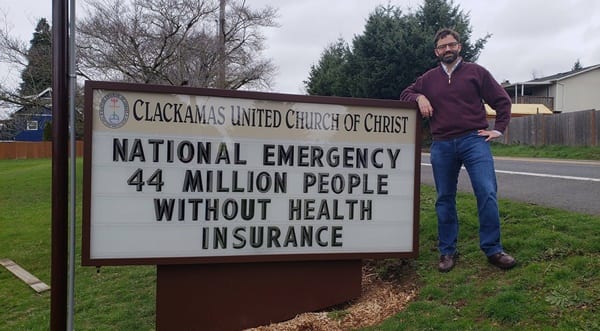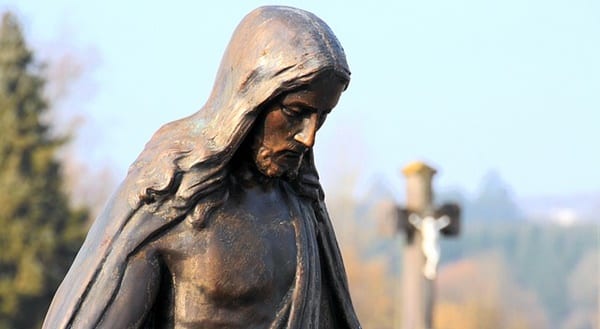The following is a sermon I preached at Clackamas United Church of Christ, near Portland, Oregon. You can read or watch the sermon below. The primary scripture texts were Genesis 45:3-11, 15 and Luke 6:27-38.
It’s been quite a week for us here at Clackamas United Church of Christ. After posting the messages on our sign this last week, we received a lot of positive feedback and also some negative feedback.
I would like to address some of the negative feedback. For the most part, the negative feedback is some version of, “Churches shouldn’t be political.”
I want to tell you this: Everything is political. We are social beings, living together. Politics tries to answer the question, “How are we going to live together?”
We are social, and thus, political beings. We are always responding in a political manner. Even the idea of political quietism is itself a response to politics.
But Jesus does not call us to be quiet. Jesus was political because he knew that the political was deeply spiritual. He preached the Kingdom of God while living in the Empire of Rome and in the Kingdom of a man named Herod. When Jesus said, “The Kingdom of God is like…” he used explosive and subversive political language. Jesus wasn’t killed because he taught us to love our neighbors, who include even our enemies. He was killed because he subverted the political, religious, and economic status quo of his day that profited some and left others out. Jesus worked for the common good. And he did it in the most subversive way possible – through direct nonviolent action based on love that sought a more just world for all people.
Churches in the United States have always been involved in the political issues of the day. In fact, our ancestors in the United Church of Christ were some of those who left Europe in hopes of finding political freedom on this continent. Our ancestors in the UCC were also on the forefront in the political struggle to end slavery in the United States and we extended that struggle a century later as we worked for the civil rights movement.
Churches have always had a voice in national politics. When there is a national emergency, churches and other nonprofits have risen to help individuals during those emergencies, but they have also worked on a policy level to help the common good.
Our brother Charlie asked a brilliant question about the relationship between churches and politics on our Facebook page that cuts to the heart of the issue for me. Charlie asked, “Should churches use a Bible that contains political messages?” It’s a brilliant point because the Bible is full of political messages. If we want a Bible without a political message, we would have to create an entirely different book.
But we know that there’s a danger in politics. Politics can become about gaining more power and wealth for yourself and your friends. People can use politics for their own good and forget about the common good.
But that’s exactly why the church is important. The Bible tells the story of prophets who confronted the political leaders of their day. Following his question, Charlie quoted the prophet Ezekiel. In Ezekiel’s day, politicians were referred to as shepherds, because they were supposed to care for their people. Ezekiel wrote, “Woe betide Israel’s shepherds, who care only for themselves. Should not the shepherds care for the flock?” The answer, of course, is yes.
The Bible tells the story of many politicians, some of them do care for their people, but many of them only care about themselves. One of the greatest politicians in the Bible was a man named Joseph.
Joseph grew up in a land called Canaan with 11 brothers, who were all plagued by sibling rivalry. Joseph was their father’s favorite son. And as anyone who has siblings knows, this is a recipe for disaster. His brothers become intensely jealous of Joseph as they wanted their father’s affection. They united in a plan to kill him by throwing him down a pit and leaving him there to die.
Joseph became the scapegoat for his brothers. They projected all of their internal jealousies and rivalries upon him. And as they united against him, they formed a glue that bonded them in a kind of unholy cooperation and mutuality. They forgot that the common good for all of them even included their annoying brother Joseph.
And here I want to take a step back and ask, have you ever been a scapegoat? Maybe you were your family’s scapegoat. Or maybe you were a scapegoat in middle school. Or maybe you are the scapegoat at your work or in your retirement community. Or maybe, if you are more like me, you are more like one of the brothers. You often find yourself more like a scapegoater or a bystander. At some point, you might have sensed the power and prestige that comes with uniting people against a common enemy. Or maybe you were part of the crowd, and you felt a strong sense of belonging, not to the common good, but to our good against that person’s good. Or maybe you were a bystander and thought it was too risky to get involved. In my life I’ve played all of these roles.
But back to Joseph and his brothers. The brothers realize that instead of leaving Joseph in the pit to die, they can make some money by selling Joseph into slavery.
Joseph becomes a slave in Egypt, but he had a gift of interpreting dreams. The Pharaoh was plagued by nightmares and soon Joseph was called to interpret Pharaoh’s dreams. Joseph said the dreams revealed a national emergency and that a massive famine was about to plague Egypt and Canaan.
Now, this is where things get even more interesting. The Pharaoh thinks Joseph is not only good at interpreting dreams, he also thinks Joseph has the skills to be a good administrator. So Pharaoh makes Joseph his right-hand man and puts him in charge of solving this national emergency.
And here Joseph has some options. As a political leader, Joseph could deal with this national emergency in basically two different ways. The first way is the way many politicians and family members have dealt with crises from the beginning of human history. It’s the same way Joseph’s brothers dealt with him. When a crisis hits, we often forget about the common good and focus on our own good. And we do this, it seems that our default mechanism is to find someone to blame. A scapegoat. Whether it’s an immigrant or the poor or women or the sick or LGBTQ folks or black people or brown people, or the list goes on. Whenever politicians try to solve a national emergency by blaming a group of people, you can be pretty sure that the emergency is made up. Or in modern parlance, you can be sure it’s “fake news.” In fact, when we blame a certain group for our problems, it is a way to distract us from the real threats facing our nation.
But Joseph didn’t take that option. He didn’t respond to the national crisis of his day by scapegoating anyone. Instead, he did something remarkable. He kept his attention on the real emergency and working for the common good, which he knew included everyone. He planned for the emergency by storing up leftover grain in the Egyptian granary. And so everyone in Egypt had enough food for the seven years of famine.
But even more remarkable was that the famine affected the whole middle east. And so people from other nations came to Egypt in search of food. Joseph could have shaken his head at them and said, “You foreigners. Why didn’t you plan for this? We Egyptians are so smart. We planned ahead! You didn’t. We don’t have enough for everyone. If we shared with you then we would run out.”
But Joseph didn’t say that. He knew that as a politician, God called him to work for the common good, which included even foreigners. Joseph believed that God put him in his place of power, not to gain more power and wealth for himself, but to share the abundance of Egypt with others.
And this is what we learn from the great spiritual stories of the Bible. During moments national emergencies, if we take a step back from the tendency to scapegoat, we will realize that we already have enough for everyone…if we just share with one another.
The Bible tells us that the flow of the universe is the flow of abundance. But unfortunately, we tend to believe in scarcity. We tend to be run by fear that there is not enough for everyone, so during times of crisis and emergency, we can easily forget about the common good and hoard things for ourselves.
But political leaders like Joseph trust that there is enough for everyone. They don’t live by fear and scarcity. They live by abundance and hope. Jesus, the Messiah, or King, trusted there was enough for everyone as he multiplied a couple of fish and a few loaves. Thousands ate and there was enough left over. These leaders are able to provide for all people – they work for the common good – because they have entered into the flow of God’s abundant love for all people – even those we might call our enemies.
And so as we hear words of national emergency, let us resist the tendency to fear and to scapegoat.
Let us remember the truth of the Bible that there is enough for all people if we work for the common good by sharing what we have with others.
And let us enter into the flow of God’s generosity, justice, and love for all people. Amen.












